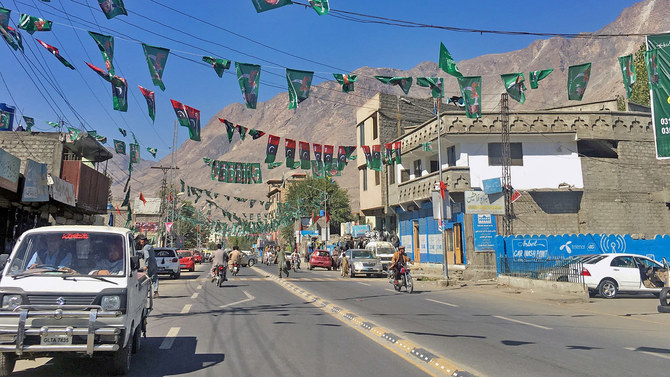GILGIT: Pakistan’s northern region of Gilgit-Baltistan on Friday elected six members to a council that coordinates between the administrative territory and the country’s federal authorities.
Gilgit-Baltistan is Pakistan’s only land link to China and is at the heart of the $65 billion China Pakistan Economic Corridor (CPEC) infrastructure development plan.
Since shortly after independence in 1947, it has not officially been part of Pakistan, but forms part of the portion of disputed Kashmir that Pakistan controls. Both Delhi and Islamabad have claimed all of Kashmir since gaining independence 73 years ago, and have fought two wars over the territory.
In Friday’s elections, Pakistan Tehreek-e-Insaf’s (PTI) Hashmatullah, Shabi-ul-Hassan, Ahmed Ali, Abdul Rehman and Ayub Shah, and Pakistan Muslim League-Nawaz-backed (PML-N) Iqbal Naseer received the required five votes from members of the Gilgit-Baltistan Assembly through a show of hand.
“All 33 members of the GB Assembly participated in the voting process,” said Rahim Gul, the returning officer. “No vote was rejected.”
The Election Commission of Pakistan is expected to announce the officials results over the next two days.
“Pakistan’s officially recognized provinces don’t have such councils since they operate within the country’s constitution and have representation in the National Assembly and Senate,” Advocate Nazir Ahmed, deputy speaker of the Gilgit-Baltistan Assembly, told Arab News earlier this week. “That’s not the case with Gilgit-Baltistan since the region doesn’t fall within Pakistan’s constitutional domain.”
He said the council, established in 2009 through the Gilgit-Baltistan Empowerment and Self-Governance Order, was created to run the affairs of the region.
In 2018, the self-governance order was replaced by Gilgit-Baltistan Order, shifting all powers exercised by the council to the Gilgit-Baltistan Assembly.
“It (the council) used to have legislative, administrative and financial powers before the Gilgit-Baltistan Order, 2018,” Ahmed said. “Now, it only has an advisory role.”
Other local lawmakers also believe political relevance of the body has declined in recent years.
Opposition politician and a former council member, Ashraf Sada, questioned the interest of the current Pakistani administration in running the region’s affairs, even though Pakistan’s federal government also appoints six representatives to the body, which is headed by the country’s prime minister.
“No session of the council has been chaired by Prime Minister Imran Khan since he came into power,” he said.
Amina Ansari, who belongs to the ruling PTI party, expressed her disappointment at the lack of women’s representation in the council.
“The PTI is the party of youth and women,” said Ansari, who is the PTI’s women wing president in the region. “Unfortunately, it is ignoring them both in Gilgit-Baltistan.”
There was no dearth of talent among GB’s women, though they were rarely given a chance by their parties, she added: “Out of six PTI candidates for the council election, no woman has been awarded a ticket.”
Last year, the government of Pakistan hinted at the possibility of elevating the region’s status to a province that could give it greater political representation within the constitutional framework of the country.
The announcement came a year after New Delhi revoked the special status of Indian-administered Kashmir in August 2019, taking away its limited constitutional autonomy.
“If Gilgit-Baltistan constitutionally becomes part of Pakistan, its assembly, council and government will be abolished,” Advocate Amjad Hussain, an opposition member in the Gilgit Baltistan Assembly, told Arab News.
He added the council already had “no value” since its legislative and administrative powers had been “snatched away by the federal authorities in 2018.”
“No member of the council can stop the prime minister from introducing any law in the region,” he added.
END
















